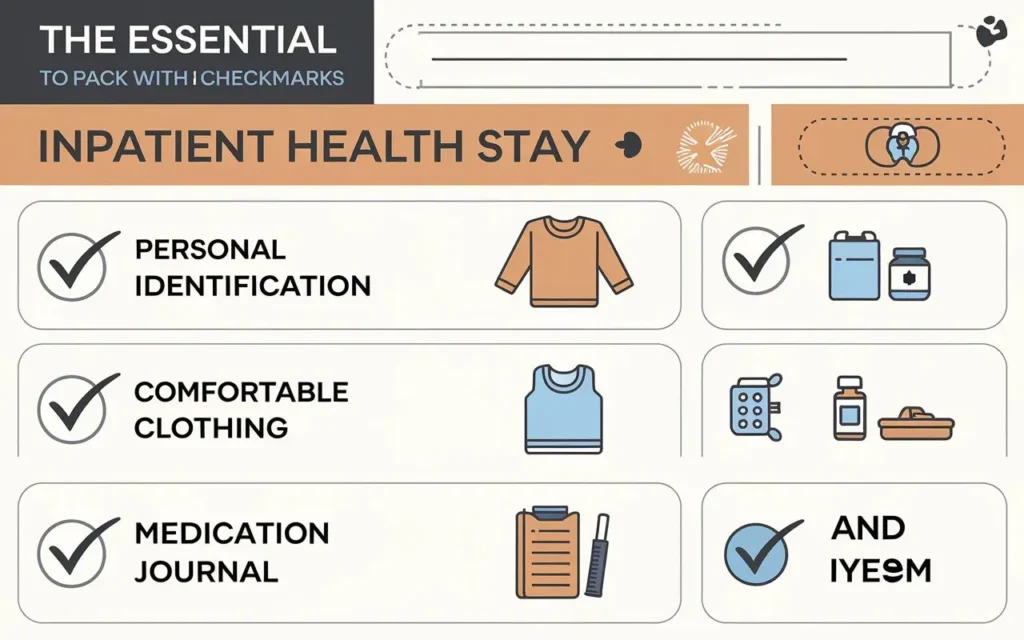How Long is an Inpatient Mental Health Stay: Comprehensive Guide
1. Understanding Inpatient Mental Health Stays

How long is an inpatient mental health stay is a fundamental question for individuals and families considering this form of treatment. Inpatient mental health stays involve hospitalization in a facility that provides intensive psychiatric care. These stays are designed to offer a safe and supportive environment for individuals experiencing severe mental health crises.
Inpatient care typically includes comprehensive treatment plans that may involve medication management, therapy sessions, and various support services aimed at stabilizing the patient. Understanding the structure and purpose of these stays is crucial for setting realistic expectations and preparing for the journey towards mental wellness.
What is Inpatient Mental Health Care?
Inpatient mental health care refers to treatment provided in a hospital or specialized facility where patients stay overnight for a period of time. This setting is ideal for those who require intensive treatment, have severe symptoms, or lack a safe environment at home.
When is Inpatient Care Recommended?
Inpatient care is recommended in situations where outpatient treatments are insufficient. This includes instances of severe depression, acute psychosis, suicidal ideation, or when a person poses a risk to themselves or others.
2. Average Duration of Inpatient Stays

How long is an inpatient mental health stay can vary significantly based on individual needs and treatment goals. On average, inpatient stays in the USA range from 7 to 14 days. However, some patients may require shorter or longer durations depending on their specific circumstances.
For example, individuals admitted for acute crises may be discharged within a week, whereas those with chronic mental health conditions might stay for several weeks or even months to ensure stability and progress.
Typical Lengths of Stay
- Short-Term Stays: 3-7 days, often for acute stabilization.
- Medium-Term Stays: 1-2 weeks, allowing for initial treatment and planning.
- Long-Term Stays: Several weeks to months, focusing on comprehensive treatment and rehabilitation.
State-Specific Variations
The length of inpatient stays can also vary by state due to differences in healthcare regulations and available resources. It’s essential to consult local facilities to understand specific guidelines and average durations in your area.
3. Factors Influencing the Length of Stay
How long is an inpatient mental health stay is influenced by a multitude of factors that determine the appropriate duration for effective treatment and recovery.
These factors ensure that each patient’s stay is tailored to their unique needs, promoting the best possible outcomes.
Diagnosis and Severity
The specific mental health diagnosis and the severity of symptoms play a critical role in determining the length of stay. More severe or complex conditions typically require longer treatment periods to achieve stability.
Treatment Response
How a patient responds to treatment is another significant factor. Rapid improvement may lead to a shorter stay, while slower progress might necessitate extended hospitalization.
Insurance and Financial Considerations
Insurance coverage can impact the duration of an inpatient stay. Different plans have varying limits and requirements, which may influence how long a patient can remain hospitalized.
Individual Treatment Plans
Personalized treatment plans, which consider the patient’s history, needs, and goals, are essential in determining the appropriate length of stay. Collaborative planning between healthcare providers and patients ensures that the stay duration aligns with therapeutic objectives.
Availability of Outpatient Support
The availability of robust outpatient support systems can facilitate earlier discharge, as patients have access to continued care post-hospitalization.
4. Short-Term vs. Long-Term Inpatient Care
How long is an inpatient mental health stay often depends on whether the care is categorized as short-term or long-term. Each type has its distinct advantages and considerations.
Understanding the differences between short-term and long-term inpatient care can help patients and families make informed decisions about the most suitable treatment approach.
Short-Term Inpatient Care
Short-term inpatient care typically lasts between a few days to a couple of weeks. It focuses on acute stabilization, crisis intervention, and the initiation of treatment plans.
- Pros:
- Quick stabilization of acute symptoms.
- Cost-effective for short-term needs.
- Facilitates rapid transition to outpatient care.
- Cons:
- May not address underlying chronic issues.
- Potential for relapse post-discharge.
Long-Term Inpatient Care
Long-term inpatient care involves extended stays, often several weeks to months, providing comprehensive treatment and rehabilitation.
- Pros:
- In-depth treatment of complex conditions.
- Comprehensive support and therapy.
- Enhanced stability and reduced relapse risk.
- Cons:
- Higher costs associated with longer stays.
- Potential disruption to personal and professional life.
5. Insurance Coverage and Costs

How long is an inpatient mental health stay is closely tied to insurance coverage and the associated costs. Navigating insurance policies is essential for managing expenses and ensuring access to necessary care.
This section provides an overview of how insurance plans typically handle inpatient mental health stays, common coverage limits, and strategies for maximizing benefits.
Understanding Insurance Coverage
Most insurance plans, including private and Medicare, offer coverage for inpatient mental health stays. However, the extent of coverage varies based on the plan type and specific policy details.
Common Coverage Limits
Insurance plans often have limits on the number of covered days for inpatient stays. These limits can range from a few days to several weeks, depending on the provider and plan.
Out-of-Pocket Costs
Patients may be responsible for co-pays, deductibles, and coinsurance. It’s crucial to understand these costs upfront to avoid unexpected financial burdens.
Maximizing Insurance Benefits
- Verify Coverage: Confirm the specifics of your insurance plan regarding mental health coverage.
- Pre-Authorization: Obtain pre-authorization from your insurance provider to ensure coverage for the intended stay duration.
- Understand Limits: Be aware of daily or weekly limits and plan accordingly with your healthcare provider.
- Appeal Denials: If coverage is denied, consider appealing the decision with additional documentation from your healthcare provider.
6. Legal Rights During Inpatient Stays
How long is an inpatient mental health stay is not only a medical decision but also a legal matter. Patients have specific rights that protect their autonomy and ensure ethical treatment during their stay.
Understanding these legal rights is essential for patients and their families to advocate effectively and ensure respectful and fair treatment.
Right to Informed Consent
Patients have the right to be fully informed about their treatment plans and to consent to or refuse specific treatments, except in certain emergency situations.
Right to Privacy
Mental health records are protected under laws like HIPAA, ensuring that personal information remains confidential unless disclosure is legally mandated.
Right to a Safe Environment
Facilities are required to provide a safe and secure environment, free from abuse, neglect, and undue restraints.
Right to Participate in Treatment Planning
Patients have the right to be involved in developing their treatment plans, including setting goals and choosing therapies that align with their preferences and needs.
Right to Appeal Discharge Decisions
If a patient disagrees with the decision to discharge them, they have the right to appeal and request a review of their case.
7. Preparing for an Inpatient Mental Health Stay

How long is an inpatient mental health stay is a key consideration when preparing for hospitalization. Proper preparation can significantly impact the effectiveness of the stay and the overall experience.
This section offers practical tips and checklists to help patients and their families prepare for an inpatient mental health stay, ensuring a smooth transition and maximizing the benefits of treatment.
What to Pack
- Personal Identification: ID, insurance cards, and any necessary legal documents.
- Comfort Items: Personal toiletries, a favorite blanket or pillow, and comfortable clothing.
- Essential Medications: Any prescribed medications, along with a list of dosages and schedules.
- Entertainment: Books, journals, or other non-digital forms of entertainment to help pass the time.
Setting Personal Goals
Defining clear, achievable goals for the inpatient stay can guide treatment and provide motivation. Goals may include developing coping strategies, improving interpersonal skills, or achieving medication stability.
Communicating with Family and Friends
Open communication with loved ones about the reasons for the stay and expected outcomes can foster a supportive environment and facilitate a smoother transition post-discharge.
Understanding the Treatment Plan
Familiarizing oneself with the anticipated treatment plan, including therapy modalities and daily schedules, can reduce anxiety and enhance participation in the recovery process.
8. Transitioning to Outpatient Care
How long is an inpatient mental health stay directly influences the planning and effectiveness of transitioning to outpatient care. Continuity of care is vital for sustained recovery and preventing relapse.
This section outlines the steps involved in transitioning from inpatient to outpatient services, highlighting the importance of coordination between healthcare providers and patients.
Developing a Discharge Plan
A comprehensive discharge plan should outline follow-up appointments, outpatient therapy schedules, and any necessary medication management to ensure ongoing support.
Building a Support Network
Establishing a strong support network, including family, friends, and support groups, provides essential emotional and practical assistance during the transition.
Continuing Therapy and Medication Management
Maintaining regular therapy sessions and adhering to prescribed medications are crucial for sustaining the progress made during the inpatient stay.
Monitoring Progress
Regularly assessing progress with healthcare providers helps identify any emerging issues early and adjust treatment plans as necessary.
9. Impact of Stay Duration on Recovery
How long is an inpatient mental health stay has a significant impact on recovery outcomes. The duration of the stay can influence the effectiveness of treatment and the long-term well-being of the patient.
This section examines the relationship between stay duration and recovery, exploring both positive and negative effects based on recent research and clinical insights.
Positive Impacts of Longer Stays
- Allows for comprehensive treatment and deeper therapeutic work.
- Provides ample time for stabilization and skill-building.
- Reduces the risk of premature discharge and relapse.
Potential Drawbacks of Extended Stays
- Higher costs and financial strain.
- Possible dependency on the inpatient environment.
- Disruption of personal and professional life.
Research Findings
Studies indicate that while longer inpatient stays can lead to more stable outcomes, the quality of care and individual patient needs are more critical factors in determining recovery success.
Balancing Duration and Quality of Care
Ensuring that the duration of the stay aligns with the quality of care provided is essential. Effective treatment planning and ongoing assessments help balance these aspects for optimal recovery.
10. Patient Experiences and Testimonials

How long is an inpatient mental health stay is a question best answered not only by professionals but also by those who have undergone the experience. Patient testimonials offer invaluable insights into the realities of inpatient care.
This section shares firsthand accounts from individuals who have experienced inpatient mental health stays, highlighting their challenges, successes, and lessons learned.
John’s Story: Finding Stability
“My inpatient stay lasted three weeks. It was a challenging time, but the support and comprehensive treatment I received were instrumental in helping me regain stability and develop coping mechanisms.”
Emily’s Journey: Overcoming Anxiety
“I stayed for two weeks due to severe anxiety attacks. The structured environment and therapy sessions provided me with the tools I needed to manage my anxiety more effectively once I returned home.”
Michael’s Experience: Long-Term Recovery
“My six-month inpatient stay was intensive, but it allowed me to address deep-seated issues and work towards long-term recovery. The relationships I built with the staff and other patients were crucial to my healing process.”
Key Takeaways from Patient Stories
- Individualized Care: Each patient’s experience is unique, emphasizing the need for personalized treatment plans.
- Support Systems: Strong support from healthcare providers and peers plays a vital role in recovery.
- Preparation and Engagement: Being prepared and actively engaging in the treatment process enhances the effectiveness of the stay.




